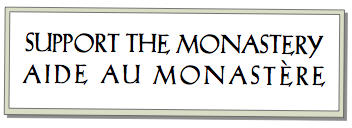+ “I simply can do no more. I am exhausted. My strength is gone. I am tired. I am depressed.” We all know these expressions and perhaps, more often than we like, they circulate in our minds and even find a home on our lips. For we are limited. We are weak. In many ways we are battle-weary or broken, scarred by trying to cling to what is good in the face of the evil of which at times even we ourselves are guilty. Fallen humanity is just that, and its lived reality is often desperate and depressing even when we try to do more than our best.
On top of this, the fragility of those with whom we live and work—and at times the wrong that they do—can weigh us down, if not oppress us. And in addition, we must deal with a hostile world that holds in contempt the truths by which we seek to live—most particularly the truth of the definitive revelation of God in the person of Jesus Christ, but also the fundamental truths of the sanctity of human life, of the God-given nature of marriage and human sexuality, etc. Even Church authorities add to our burden at times through the obfuscation if not denial of the truths of the faith in their pursuit of worldly acceptance, and in their active persecution of what is “sacred and great” in the Church’s millennial tradition. Quite understandably, we may arrive at Pentecost Sunday with little strength and, perhaps, with little hope or perhaps even little expectation of finding any.
We do not know very many of the thoughts and words of the Apostles following the dramatic events of Good Friday, but we can begin to imagine the fear and uncertainty mixed with disappointment and indeed the depression they may have contained. They were a tiny group whose credibility had been repudiated by a sham trial leading to the brutal public execution of their leader. They had no idea what would happen next.
We know a little more about their reactions to the incredible event that is Easter morning, and to the Risen Christ’s appearances thereafter—including St Thomas’ incredulity, leading to Our Lord’s famous rebuke: “Have you believed because you have seen me? Blessed are those who have not seen and yet believe.” (Jn 20:29) It seems that, naturally enough, the singular and world-changing reality of the Resurrection of the executed criminal Jesus of Nazareth from the dead, took some time to impregnate the hearts, minds and souls of even His closest followers. (And from that we ourselves can, surely, draw some hope!)
Indeed, even having experienced the direct appearances of the Risen Christ, and having witnessed his Ascension into heaven, the Apostles were still in need—a need which, as the Gospel of this Holy Mass teaches us, Our Lord understood only too well.
It is precisely in this context, in the face of the reality of substantial human frailty and need, that God the Holy Spirit descended upon the Apostles at Pentecost, transforming them in all the ways described in the beautiful sequence of this Mass, and filling them with His sevenfold gifts. Exhausted, tired, weak, depressed, sinful men became fearless Apostles of the Truth who is Jesus Christ, preaching His Gospel to the very ends of the earth and giving their very lives so that souls may be saved.
My brothers and sisters, whether the challenges we face today are greater or lesser than those of the Apostles is a matter for academic speculation. The fact remains that we face them and that it is our God-given vocation to confront them—not with our own prideful Pelagian efforts, but in and through the strength of the power of God the Holy Spirit who can and who does give us all that we need so to do, each of us according to our particular vocation. We, too, can be foundation stones for the upbuilding of the Church of Christ in the world of the twenty-first century if only we open our hearts, minds and souls to His power, to the gifts He wishes to give us.
This, of course, implies that we do our part in opening ourselves to His gifts, and in purifying ourselves in mind and body so as worthily to receive them. God the Holy Spirit will not intrude where He is not welcome, and nor can He enter into a heart that is full of vice and sin. As St Gregory the Great taught us at matins this morning: when we expect the arrival of an important guest, we clean our home and put everything in order. How much more so must each of us do so if we hope to receive God the Holy Spirit and all the gifts He brings!
At this very moment approximately 20,000 pilgrims are making their way to the great Cathedral of Chartres, praying, singing, confessing and listening to spiritual exhortations. They are no doubt tired; some will be injured, and yet they march on in the hope of receiving the graces which perseverance itself occasions. Our monastery is privileged to be amongst the ‘guardian angels’ of the pilgrims. As we accompany them with our prayers, let us also draw hope and instruction from their efforts. We may be tired, depressed and injured and weak. But God the Holy Spirit’s strength and power can and will transform us—if only we allow Him so to do. +
On top of this, the fragility of those with whom we live and work—and at times the wrong that they do—can weigh us down, if not oppress us. And in addition, we must deal with a hostile world that holds in contempt the truths by which we seek to live—most particularly the truth of the definitive revelation of God in the person of Jesus Christ, but also the fundamental truths of the sanctity of human life, of the God-given nature of marriage and human sexuality, etc. Even Church authorities add to our burden at times through the obfuscation if not denial of the truths of the faith in their pursuit of worldly acceptance, and in their active persecution of what is “sacred and great” in the Church’s millennial tradition. Quite understandably, we may arrive at Pentecost Sunday with little strength and, perhaps, with little hope or perhaps even little expectation of finding any.
We do not know very many of the thoughts and words of the Apostles following the dramatic events of Good Friday, but we can begin to imagine the fear and uncertainty mixed with disappointment and indeed the depression they may have contained. They were a tiny group whose credibility had been repudiated by a sham trial leading to the brutal public execution of their leader. They had no idea what would happen next.
We know a little more about their reactions to the incredible event that is Easter morning, and to the Risen Christ’s appearances thereafter—including St Thomas’ incredulity, leading to Our Lord’s famous rebuke: “Have you believed because you have seen me? Blessed are those who have not seen and yet believe.” (Jn 20:29) It seems that, naturally enough, the singular and world-changing reality of the Resurrection of the executed criminal Jesus of Nazareth from the dead, took some time to impregnate the hearts, minds and souls of even His closest followers. (And from that we ourselves can, surely, draw some hope!)
Indeed, even having experienced the direct appearances of the Risen Christ, and having witnessed his Ascension into heaven, the Apostles were still in need—a need which, as the Gospel of this Holy Mass teaches us, Our Lord understood only too well.
It is precisely in this context, in the face of the reality of substantial human frailty and need, that God the Holy Spirit descended upon the Apostles at Pentecost, transforming them in all the ways described in the beautiful sequence of this Mass, and filling them with His sevenfold gifts. Exhausted, tired, weak, depressed, sinful men became fearless Apostles of the Truth who is Jesus Christ, preaching His Gospel to the very ends of the earth and giving their very lives so that souls may be saved.
My brothers and sisters, whether the challenges we face today are greater or lesser than those of the Apostles is a matter for academic speculation. The fact remains that we face them and that it is our God-given vocation to confront them—not with our own prideful Pelagian efforts, but in and through the strength of the power of God the Holy Spirit who can and who does give us all that we need so to do, each of us according to our particular vocation. We, too, can be foundation stones for the upbuilding of the Church of Christ in the world of the twenty-first century if only we open our hearts, minds and souls to His power, to the gifts He wishes to give us.
This, of course, implies that we do our part in opening ourselves to His gifts, and in purifying ourselves in mind and body so as worthily to receive them. God the Holy Spirit will not intrude where He is not welcome, and nor can He enter into a heart that is full of vice and sin. As St Gregory the Great taught us at matins this morning: when we expect the arrival of an important guest, we clean our home and put everything in order. How much more so must each of us do so if we hope to receive God the Holy Spirit and all the gifts He brings!
At this very moment approximately 20,000 pilgrims are making their way to the great Cathedral of Chartres, praying, singing, confessing and listening to spiritual exhortations. They are no doubt tired; some will be injured, and yet they march on in the hope of receiving the graces which perseverance itself occasions. Our monastery is privileged to be amongst the ‘guardian angels’ of the pilgrims. As we accompany them with our prayers, let us also draw hope and instruction from their efforts. We may be tired, depressed and injured and weak. But God the Holy Spirit’s strength and power can and will transform us—if only we allow Him so to do. +




























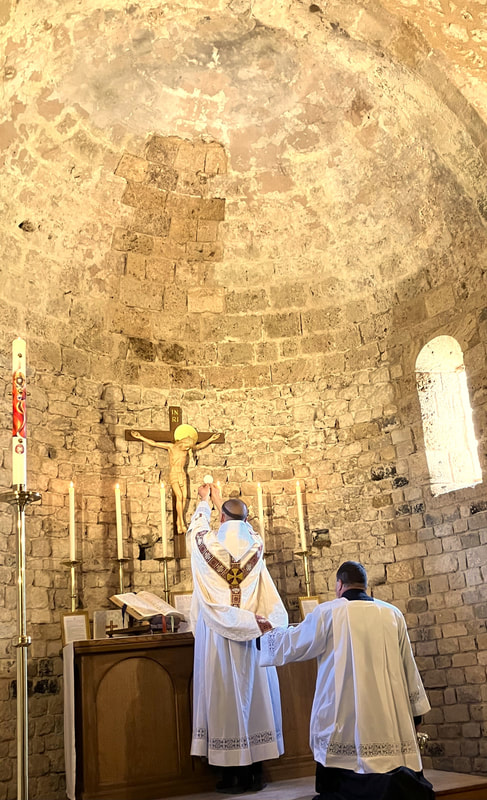
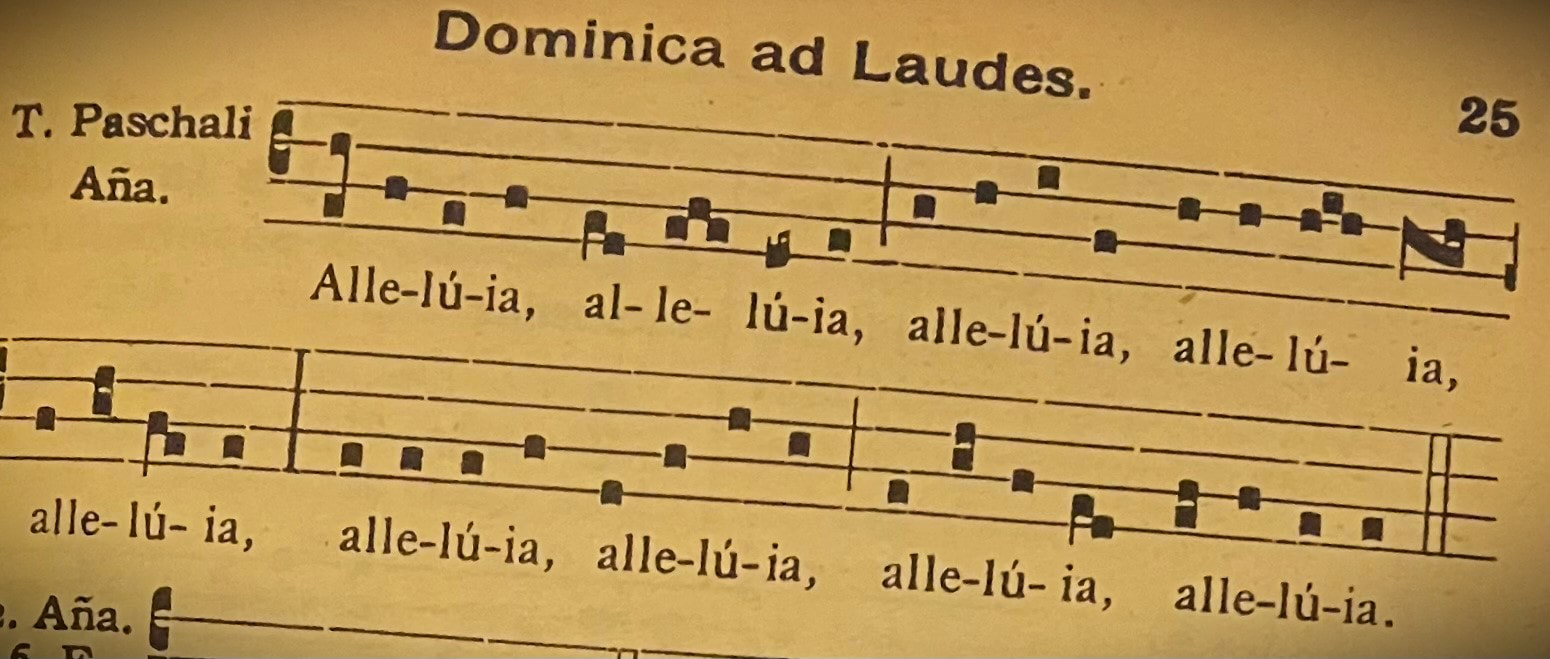
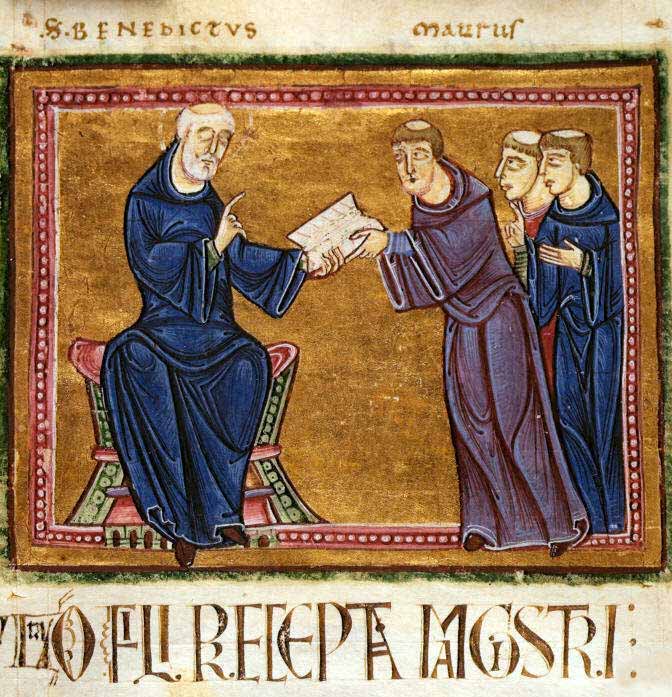
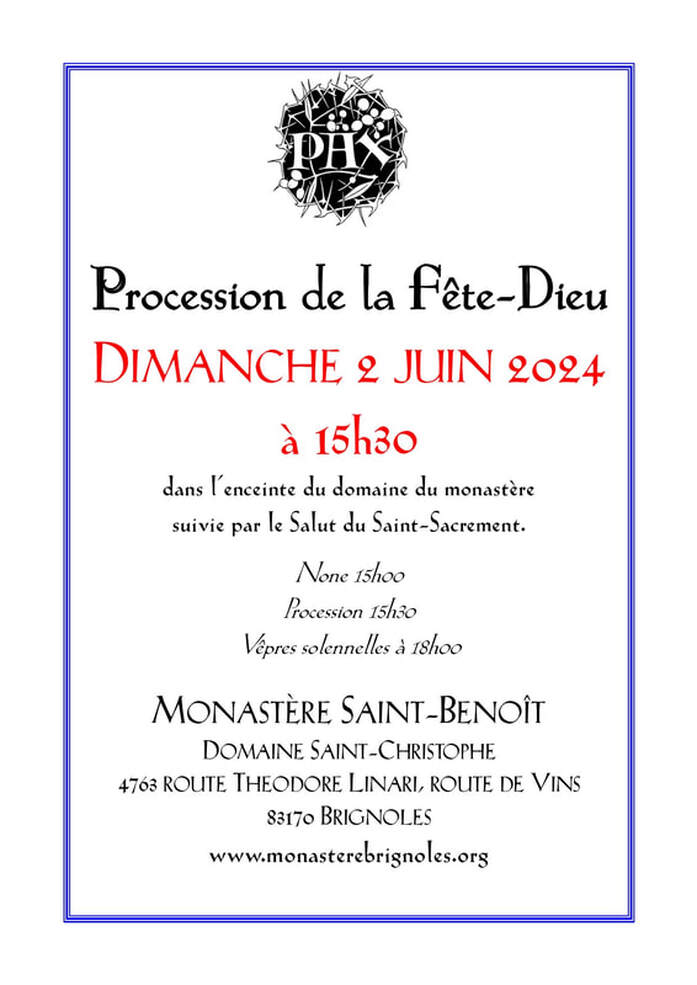
 RSS Feed
RSS Feed
